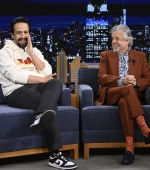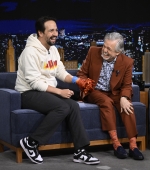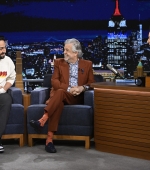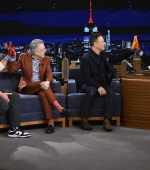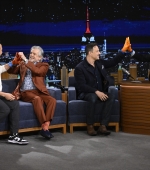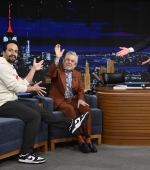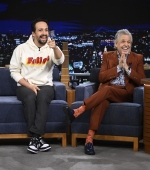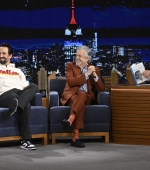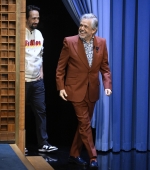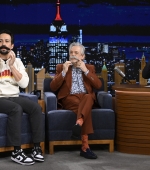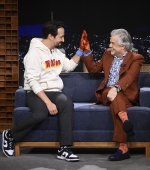After the last episode of the second season aired on HBO, some interviews given by Lin-Manuel Miranda where published online by several sites, such as Entertainment Weekly, Variety, Slate and Gizmodo
.
WARNING: SPOILERS AHEAD.
ENTERTAINMENT WEEKLY: At the risk of ticking off fans of another popular fantasy series, it seems your watch has ended.
LIN-MANUEL MIRANDA: Haha! Yes. Hodor. Please. Hodor.
What was your reaction when you found out that Lee would be going out in this blaze of glory? And then what was it like acting it out?
Well, my first reaction was back in 2005 when I read the books. I had that in the back of my mind when I said yes to the gig. I’m gonna have to do one of the most heartbreaking deaths in literature, or at least in the literature that I’ve read. So, I think a part of me has been preparing since I signed on for the gig. One of the things that’s so affecting about it and the genius of Philip Pullman is every death in this story is two deaths. We haven’t just gotten to know Lee, we’ve gotten to know Hester and their relationship. I think that’s the extra twist that you never see coming. It’s heartbreaking in the book, and I hope we did it a bit of justice.
I also found something really beautiful about this moment. Everybody in Lyra’s world who has a daemon comes with this blessing that they are not alone in their final moments on earth. I was curious if you had any thoughts on that for Lee.
Pullman wrote a book called Daemon Voices where he wrote a series of essays about his thinking around the series, and the notion of a daemon was a storytelling solution. [People] can monologue about what they’re doing and how they’re feeling if they have someone to talk to. So, why don’t I put their souls outside their body? And it’s so simple and so elegant, but you’re right, it brings this incredible moment of solace in the final moment. I haven’t read The Subtle Knife for many years. I didn’t want to re-read it and get too attached to anything in case our version strayed. But the line that always stayed with me is Lee saying to Hester, “Don’t you go before I do.” That is a beautiful, heartbreaking line.
Read the rest of the Entertainment Weekly interview and the others under the jump.
ENTERTAINMENT WEEKLY: Have you paid any attention to the social media reaction surrounding Lee’s death in the U.K.? [The finale episode aired earlier in abroad on Sunday, Dec. 20.)
Yes. I felt it psychically on a Sunday afternoon here in New York that things were sad. And another thing I’m grateful for, and this is a technical thing but I think it makes a difference, is so much of the time when you’re filming a series, especially a VFX-driven series like this, you’re filming out of order. You’re at the whims of the schedules that are available, the locations that are available, but with this sequence, with Alamo Gulch, we filmed sequentially. We landed in the gulf on Monday and I died on Friday, and every scene happened in order as we created that sequence in that space, which I think helped the storytelling enormously and also helped from a performance perspective because it’s just us fighting to stay alive over the course of a week. You see it in an hour, but there was a week of filming.
So, was that the last scene you shot for the entire second season?
It’s not. My last scenes were in the balloon, but we did have the luxury of filming that sequentially. It was Monday we get there and we see that we’re being followed [by the Magisterium], Wednesday I had to say goodbye to Andrew Scott, and the last two days I was there by myself with the brilliant puppeteer who played Hester.
Was there a camaraderie with Andrew being that both your characters died off in this episode?
Yes, but the thing that made my stomach hurt when the U.K. reaction started was I forgot [John Parry] died. From my perspective, I’m fighting them off so he can keep going. “Oh sh–! He dies, too!” That’s a lot for the viewers. We had an amazing time filming that sequence. Something that we talked about a lot was Band of Brothers. Andrew worked on that when he was a very young actor years ago. That was something we talked about a lot in relation to the chaos of war and the logistics of filming a gun battle like that. The joy of working on this show is the backlot is all of Wales. It’s just gorgeous country. I posted a picture of us taking naps on cots in a shared trailer because we were so far into this wooded area to film Alamo Gulch that it was not a typical base camp where everyone has their own trailer with their own TV. We were in a Welsh person’s rented Winnebago that could go up this hill, and that’s where we ate lunch and dried off. We were in the mud and in rain all day. But it also protects the work in a very real way because you’re not unplugging from where you are when you’re on a break. You just go off into a corner of the muddy gulch.
One of the lines that you say as Lee that sticks with me is after his balloon crashes and he turns to Hester and says, “I’m no longer an aeronaut. We’re insects now.” Going into this sequence, what to you defines Lee’s last leg of this journey?
What is moving about it is Lee gives himself permission to do the impossible and make the ultimate sacrifices because he continues to remind himself what he’s fighting for and that is Lyra. I wasn’t dealt the best hand of cards in terms of parents, neither was Lyra, but she’s got a better shot than I do. And if it takes losing the balloon, if it takes holding these folks off and possibly losing my life so Parry can go forward and get Lyra what she needs, I can accept all of this: death, mortality, pain. He really makes Lyra into a higher cause. I find that enormously moving. It’s an instict that kicks in when you become a parent in a very real way, but it’s another thing to see it and have to enact it.
Is there still an opportunity for Lee to come back for season 3, given that The Amber Spyglass deals with the world of the dead?
Yeah. There’s been no — We just found out today that season 3 was happening and that’s really exciting news and I’m glad they get to finish telling the story. The final scenes; no, I’m not gonna say that because it’s a spoiler. But, yeah, my answer is I serve at the pleasure of Bad Wolf Productions. If there’s a call for Lee in a corporeal or non-corporeal form, I would be there. My family would love to go back to Wales.
I know Philip Pullman’s books are really close to your heart. What has this role of Lee meant to you and being able to put your own spin on the character?
When Lee first appears in the books, it’s the first really big hint that Philip Pullman’s universe is bigger than anything than we’ve been picturing. A Texan aeronaut is not on anyone’s bingo card as they were reading that story, and suddenly you’re hinting at a much wider world than Oxford and the trip north that we’ve been accustomed to. It’s been a larger-than-life character and the DNA that he shares with our main character, Lyra, who’s the hero of the entire series, is this notion of doing the right thing. Jack Thorne talks about greatness versus goodness being a theme in this. There are many people trying to do “great things” in this story which required terrible and immoral acts, whereas Lyra is always motivated by doing the good thing, the right thing. It’s not the same thing as doing “great things” and I think Lee shares that.
Are there any big moments from filming this show that will stick with you?
The week in Alamo Gulch was an absolute highlight, and then the other one that comes to mind is the scene with Mrs. Coulter [season 2, episode 3] which is not in the books but I’m incredibly grateful for because we learn a lot about Mrs. Coulter, we learn a lot about Lee. It’s a really unexpected twist of a scene and was just enormous fun to play from beginning to end, every layer of it. And I’m really grateful that fans of the books embraced that scene because it’s a detour, but I think it’s a detour that honors the characters in the book.
VARIETY: What was your reaction to watching Lee perish in such dramatic fashion?
LIN_MANUEL MIRANDA: Can I tell you a secret? I haven’t watched the final episode because it hasn’t aired in the States yet. I did watch the U.K. post all the crying emojis and I did go through it in person. Often you’re shooting out of sequence, you’re shooting at the whims of weather or schedules or locations, especially on an effects heavy show like His Dark Materials. But we were able to film the Alamo Gulch sequence sequentially. We started on a Monday and I died on a Friday, so the playing of it was very organic and I think that paid off in terms of the performances. It wasn’t the last thing I filmed, but I’m really grateful that we were able to shoot it in sequence because I just think it helps in terms of where Lee and Hester get to by the end.
Where they get to is a place of ultimate sacrifice for Lyra and her cause, capped off by that heartbreaking line from the books, “Don’t go before I do.”
We always felt an extra responsibility when we are quoting the books directly, because those are lines that have been circled and dog-eared and highlighted and made into fan art by generations of fans at this point, so you really want to honor them and get them right. What I remember the most from The Subtle Knife was, “Don’t you go before I do” and “We’re helping Lyra.” It’s this notion that Lee continues to center himself and is able to make the ultimate sacrifice because he reminds himself of a greater cause, which is his love for Lyra and what she has to do for the world.
It’s a poetic ending which completes Lee’s arc in a way?
It’s a beautiful thing. The arc of Lee is someone who is kind of a drifter, who finds a sense of purpose through his love for this kid, who he sees a bit of himself in. This is a really bright kid who has been dealt a bad hand in the parent department, and he’s just going to do everything he can so that she can go forward.
How was it to shoot those final moments opposite your dæmon?
It took me back to the genius of Philip Pullman who created this notion of dæmons. I think it’s two things. One, from a storytelling perspective, it’s brilliant because no one’s ever alone. Even in his final moments, Lee has someone to talk to and there’s a dialogue to be written, and you get a sense of those people. Then the other thing that’s sort of a brilliant side effect of this innovation of Pullman’s conceit that every human has a dæmon that is their soul, is that it’s two deaths we’re mourning: we’re mourning Lee’s death and Hester’s death. That was so overwhelming as I read the U.K. reactions. It was about half, “No, Lee,” crying emoji, and half, “No, Hester,” crying emoji. We’ve gotten to know and love both of them.
And then to make matters worse we see Jopari die in his son’s arms about fives minutes later having been reunited for the first time in years. It’s a triple knockout.
I was not thinking about that during the death scene because from my perspective Jopari goes forward; I was holding down the fort so that he can keep moving. But that’s going to be the part that makes me cry when I finally watch it because I haven’t been witness to that.
You shared videos of yourself and Andrew pretending to be Sam Neill from Jurassic Park and then a photo of the two of you napping in a caravan. You two seem to have formed quite the rapport.
We had a wonderful time working together. We’re both theater kids and the fun thing about those sequences was we were way up in the Welsh countryside. Normally, when you’re filming in a studio, you have a base camp, you each go to your separate trailers and you have your own little space. There was no luxury of that when we were filming those final scenes, we are in a rented Winnebago belonging to a local person up there because it’s just too treacherous a journey all the way back to base camp. It was this pink, very flowery Winnebago and we’re like all right, let’s dry off from the mud and have a nap. I also think being that far in on location, you also kind of shut out the outside world, and you really only focus on the work and that’s been one of the great gifts of playing this role and being in Philip Pullman’s world. As my life has gotten more hectic, working on the show is like a holiday for me. I just get to go fly a hot air balloon and learn how to fire a gun and do stunts. It was just the most fun thing to get to live inside this world I loved so much.
It has been confirmed that the show has been renewed for a third and final season, meaning it will have a shot at tackling the final novel on Pullman’s original trilogy, The Amber Spyglass. How significant is that?
Well, listen, it’s very significant. I’m really excited that they get to finish telling the story. I’m a huge fan of these books, I remember being so bummed that when they made the movie of Golden Compass [and it] wasn’t going to get a sequel. The fact that they get their chance to finish telling Philip Pullman’s story is really exciting. That third book is so ambitious, I can’t wait to see what they do with it.
It’s certainly the wildest of the three, Lee and Hester even make a return of sorts in a different form. Have there been any discussions of that taking place in Season 3?
Nothing has been written in stone or finalized, but I’ve always told them this is enormous fun for me and I serve at the pleasure of Bad Wolf Productions. If they see fit for Lee and Hester to return in corporeal or non-corporeal form, I’ll answer the call. But they just got the green light, so I don’t even know how much exists and is written yet.
SLATE: Level with me. When you got the role of Lee a couple of years ago, how much of your excitement was about getting to play this final shootout?
LIN-MANUEL MIRANDA: Well, yeah, I mean excitement and dread, right? Like it’s one of the most heartbreaking ways to go in any literature I’ve read, full stop.
What makes it so sad?
I think the secret of it is that it’s not one death, it’s two deaths, it’s Lee and Hester. I watched the reactions on social media when the episode aired in the U.K. and it was about 50-50 people screaming, “Lee”—crying face, crying face, crying face, and “Hester”—crying face, crying face, crying face. So it’s a double heartbreak, because they are such a unit and we’ve gotten to love them both.
As someone who’s written death scenes, what do you think makes this one work? What’s the engine driving it?
That sentence Lee says, “Those men didn’t have to come to this, and neither did we.” That speaks volumes of the futility of war. And when we are thrown into battles that are waged over ideas that are above our pay grade. But I also think that Lee’s belief in his personal cause—which is purely that Lyra might live—is heartbreaking because he goes all the way in. When we meet Lee, he’s kind of picking pockets and he’s in bar fights, and is kind of a bit adrift. He’s secure in who he is based on the way he banters with Hester, but he’s adrift. And then in meeting Lyra, he finds someone to care about and someone to… He finds a cause in his life worth fighting for.
Where did you film the scene and what was the experience like?
We filmed it way up in the wilderness in Wales. One of the things I’m grateful for is that we filmed it sequentially, which has not always been the case on this show. Whenever you have a show that has a lot of effects, you’re filming Episode 4 this day and Episode 3 the next. But for Alamo Gulch, we filmed the whole thing in order over the course of a week. So we got to Alamo Gulch on Monday and I was dead on Friday, and every step you see in that sequence happened in order. We all got there together.
Did you have an on-set Hester to interact with?
Yes. I had a brilliant puppeteer who also does lines for me. So yes, there’s a puppet there that gets erased in post and replaced by the CGI Hester.
There’s a whole universe out there of readers who I’m sure you’ve encountered over the past couple of years for whom these characters really, really matter. I mean, like, I named my daughter Lyra, and I’m not even one of the crazy ones.
Wow.
I know. How does it affect your work to play a character who’s in so many people’s heads already? Can you think about that at all? Or do you just have to shove it out?
Honestly you have to shove it out, because there’s already been an iconic Lee Scoresby [in the movie The Golden Compass], you know what I mean? Sam Elliott’s who I pictured.
Fair.
So when the producers and Jack Thorne came to me and said, “We thought of you for Lee,” I went, “OK, this is just a different direction. They’re drawing more upon the young Lee of Once Upon a Time in the North.” And also, I’m a hardcore fan of the books. Like, one of the songs in In the Heights, When the Sun Goes Down, is based on a Will and Lyra moment in that third book. At the risk of spoilers.
And so I’ve also been really pleased to see that the line that the writers have taken with the show is kind of… faithful-plus. Like, it’s faithful to the things that I think matter to me as a fan, but then there’s these detours. Like Lee getting to face off against Mrs. Coulter. That doesn’t ever happen in the books, but it’s enormously satisfying.
What did that scene with Mrs. Coulter teach you about Lee?
It links Lee and Lyra in a very specific way. And when Lee sees the damaged—I mean, incredibly powerful and brilliant, but damaged—parents Lyra’s coming from, he senses a kinship with her that is chemical. But also that childhood that he faced is also something he and Mrs. Coulter share. And, the fact that he’s able to find a common ground with her is really unexpected. She’s kind of the big bad in the first book, but she grows into something so much more complicated because she really loves her daughter and would do anything for her.
And getting to play with Ruth Wilson was like a dream that I didn’t think would happen. It was sort of like, “Wow, I have this great cast and I… see some of them.” I never see James McAvoy, but I got to work with Ruth Wilson.
Lee’s character is cut from a very old-fashioned storytelling cloth. He’s a cowboy hero and a marksman and a sly fox. When you were playing him, how did you approach making him particular to you?
I thought a lot about my grandfather. My grandfather is of that generation who had a dime-store Western novel in his pocket at all times. He had hundreds of them. Spanish language Westerns by a guy named Estefanía, it was always Estefanía on the cover. One of the last memories I had with him is us watching the first season of Deadwood together. He just was crazy about Westerns. So I thought about the heroes that my grandfather loved so much from that genre. And then the other thing was, like, my accent was very much my Mexican cousins who live in Corpus Christi. I’m not trying to do the typical thing.
That’s so interesting, because I feel like Latino representation in the classic Westerns is not… uh… not great, overall.
Not great, and that all used to be Mexico, guys.
[GIZMODO] Miranda told us Lee’s death scene was “one of the things that excited me about doing the role in the first place”—not only because of how impactful it is as a whole but because of how unique portraying it onscreen would be.
“The thing is about every death of His Dark Materials, that is so moving, is it’s always two deaths, right? Like, we’ve not just gotten to know Lee, we’ve gotten to know Hester. We’ve gotten to know their relationship. So it’s like the extra twist of, ‘Oh shit, we lose Hester too!’ And the way in which they love each other and have a real camaraderie makes it all the more heartbreaking,” Miranda said. “I think that’s the line that I always remember from the second book is, ‘Don’t you go before I do,’ that Lee says to Hester. It’s beautiful and it’s incredibly sad. I think I first read these books in 2006, 2005? It has stuck with me even since then.”
Sadly, co-star Cristela Alonzo was not on set voicing Hester during the week they filmed Lee Scoresby’s final battle. In fact, Miranda said he and Alonza never worked together in-person during their time on the show. Instead, Miranda worked with the puppeteer who play-acted Hester (before she was replaced with CGI in post-production), someone he built a strong relationship with over the course of the series.
Miranda did get a lot of time with Scott, as the two of them spend much of season two traveling together (while sharing goofy videos on Twitter). Miranda noted how cold, rainy, and dreary much of the battle’s filming was, and that Scott gave him some helpful advice to handle the shoot based on his experience on Band of Brothers. However, Miranda said in all the hoopla, even though the two of them bonded quite a bit on set, they never commiserated on the fact that both their characters die in the same episode.
“From my perspective, I never thought about it. I just thought, ‘I’m going to die so he can keep moving!’ That’s the extent to which I thought about it, sort of conveniently forgetting that he doesn’t last much longer than me,” he said while laughing.
Of course, Lee Scoresby and Jopari’s deaths aren’t necessarily the end of their stories. Without spoiling events from The Amber Spyglass, let’s just say mechanisms are in place for Lee and others who’ve perished on the show to return in the third and final season, which was announced last week. Our talk with Miranda happened just a few hours after the third season was confirmed so we asked whether he’d be coming back. He was cagey about confirming anything but noted that he’d happily do so if the opportunity arose.
“If they deem it possible, I’ll drop everything,” he said. “If there was an opportunity for Lee to appear, I would, of course, welcome that. But nothing has been said so far. I just very happy about the news today that they will get to finish out the story.”
